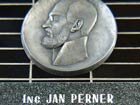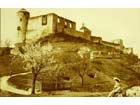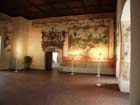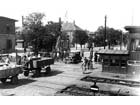History/History/Property of the crown
Property of the crown
Pardubice lost its prominent status as residence town with the departure of the Pernštejn family. The officials of the lordly administration moved into the chateau, which from that time on was only ever really modified in the spirit of the commercial interests of the demesne. The loss of the residential function of the town was gradually seen in its appearance and economic development.
Pardubice suffered terrible destruction during the Thirty-Year War after becoming a frequent residence of military garrisons due to its advantageous strategic position. What is more, the suburbs were sacrificed for extended city walls. These walls were able to withstand a 1645 siege by General Torstensson, but the town itself lay in ashes after a Swedish attack. It is little wonder that Pardubice lost half its population during these wartime years.
Not even in the two hundred years that followed did the town come close to the famous era of the Pernštejns. Its importance and renown waned, although it did welcome monarchs on occasion and was long a significant fortification. However, it was affected by war, which did not help life in the town.
Pardubice experienced another period of prosperity with the arrival of the railway. The original track was built in 1845 and ran from Olomouc to Prague, prominent rail expert and native of Pardubice Ing. Jan Perner playing a prominent role in building the line. This soon began to spread and the onward development of the railway preordained the position of Pardubice as a significant transport junction. The town’s ideal position in the very heart of Bohemia played a crucial role here.
The arrival of the railway in Pardubice saw the development of industry, which stimulated the development of trade and other areas. Indeed Pardubice was one of the ten towns with the fastest rising population in the country for a few decades at the turn of the 19th and 20th centuries. This was naturally mirrored by the advancement of social and cultural life in the town.
This prosperous development was halted by the First World War, which ended with the establishment of an independent Czechoslovakia and the arrival of new prospects in Pardubice.


.jpg)


.jpg)
.jpg)
.jpg)
